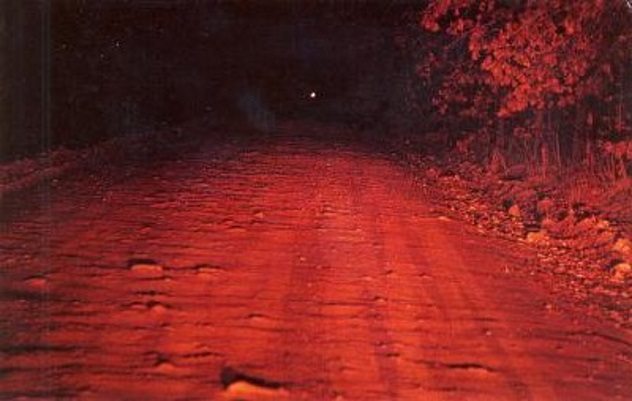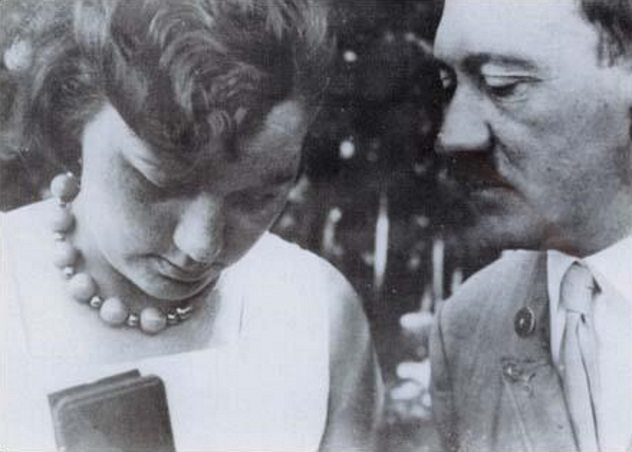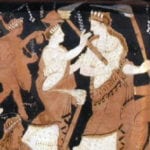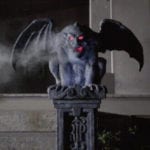 History
History  History
History  Health
Health 10 Everyday Activities That Secretly Alter Consciousness
 History
History Top 10 Historical Disasters Caused by Someone Calling in Sick
 Animals
Animals 10 New Shark Secrets That Recently Dropped
 Movies and TV
Movies and TV 10 Forgotten Realities of Early Live Television Broadcasts
 Technology
Technology 10 Stopgap Technologies That Became Industry Standards
 Weird Stuff
Weird Stuff 10 Wild Facts About Taxidermy That You Probably Didn’t Know
 Travel
Travel 10 Beautiful Travel Destinations (That Will Kill You)
 Miscellaneous
Miscellaneous 10 Modern Marriage Rituals Born from Corporate Branding
 Weird Stuff
Weird Stuff Ten Bizarre Visions of 2026 from Fiction
 History
History 10 “Modern” Problems with Surprising Historical Analogs
 Health
Health 10 Everyday Activities That Secretly Alter Consciousness
 History
History Top 10 Historical Disasters Caused by Someone Calling in Sick
Who's Behind Listverse?

Jamie Frater
Head Editor
Jamie founded Listverse due to an insatiable desire to share fascinating, obscure, and bizarre facts. He has been a guest speaker on numerous national radio and television stations and is a five time published author.
More About Us Animals
Animals 10 New Shark Secrets That Recently Dropped
 Movies and TV
Movies and TV 10 Forgotten Realities of Early Live Television Broadcasts
 Technology
Technology 10 Stopgap Technologies That Became Industry Standards
 Weird Stuff
Weird Stuff 10 Wild Facts About Taxidermy That You Probably Didn’t Know
 Travel
Travel 10 Beautiful Travel Destinations (That Will Kill You)
 Miscellaneous
Miscellaneous 10 Modern Marriage Rituals Born from Corporate Branding
 Weird Stuff
Weird Stuff Ten Bizarre Visions of 2026 from Fiction
10 Creepy And Obscure Unsolved Mysteries
Mysteries stir our curiosity, mesmerizing us until they can be solved. Though supernatural causes or conspiracy theories are more fun to think about, mysteries often end up with surprisingly banal explanations. However, there are cases which remain unsolved, perhaps forever, and they are often the most intriguing.
10 The Murder Of Julia Wallace

Julia Wallace was a British housewife who lived at 29 Wolverton Street in Liverpool. On January 19, 1931, her husband William went to the local chess club for a regular game. When he arrived, he was told a message was left for him by a man named Qualtrough, a name William didn’t recognize, telling him to go to 25 Menlove Gardens East. The next day, William did just that, leaving his wife at home. He ultimately discovered it was a phony address, having spent nearly an hour wandering up and down the road.
Despaired, William went home, where he was shocked to discover his wife’s bloody, beaten corpse lying in their parlor.[1] Police arrested William about two weeks later, convinced he had left himself a phony message, as the call came from a box only a few hundred yards from his chess club. Even though most of the evidence against him was circumstantial, William was convicted and sentenced to death.
William’s case was brought up to the Court of Criminal Appeal, which rarely overturned jury decisions. However, the Court decided this case warranted it, and William was set free. To this day, no other person has been charged with the crime, and it remains unsolved.
9 The Big Grey Man Of Ben MacDhui

Known in Scotland as Am Fear Liath Mor, the Big Grey Man of Ben MacDhui is a cryptid, similar to the Yeti or Bigfoot. He is said to be found on Ben MacDhui, the largest peak in the Cairngorm Mountains, and it first became more than a local legend in 1889, when Professor Norman Collie allegedly saw it.[2] Though he technically didn’t see the Grey Man, he was quoted as saying: “I heard something else other than my own footsteps. For every few steps I took I heard a crunch and then another crunch as if someone was walking after me but taking footsteps three or four times the length of my own.”
Various other accounts have come from a number of people since then, including Peter Densham, a member of the airplane rescue team for Ben MacDhui. Naturalist and mountaineer Alexander Tewnion also claimed to have seen the Grey Man, firing three shots from his pistol at a figure which charged at him through the mist. A Brocken spectre, a phenomenon where an observer’s shadow is cast upon the surfaces of clouds opposite the Sun, has been claimed to be the cause of these so-called sightings, although that doesn’t explain the sound of an extra pair of footsteps.
8 The Hessdalen Lights

Sightings of this particular phenomenon go back as far as 1811 and occur in the Hessdalen Valley, which is in the middle of Norway. However, in the early 1980s, the lights became much more frequent, with a peak of nearly 20 separate reports each week. Since then, the sightings have decreased in frequency, with observations numbering 10–20 per year. Normally, the lights are either bright white or yellow and hover above the ground.
Various scientific studies have been commissioned to find out the source behind the lights, but no conclusive explanation has been found. (There are cameras stationed around the valley, set up to take pictures of any bright light.) Studies meant to refute some of the findings have pointed out a variety of logical explanations, including car headlights and mirages, though they admit that such things don’t necessarily explain every occurrence.[3]
7 The Great Amherst Mystery

In the latter half of the 19th century, in a little town called Amherst in Nova Scotia, a woman named Esther Cox was beset by what she claimed were poltergeists. Esther lived in a house with her sister and her family. After Esther had been nearly killed by a male friend of hers, who may have suffered a psychotic break, her house began to be haunted. After spending some time at another sister’s house in a nearby province because of her failing health, Esther returned to Amherst, whereupon the hauntings began again.[4]
After the poltergeists threatened to burn down the house, Esther moved in with another family, whose house became haunted as well. Part-time actor Walter Hubbell moved in with Esther, as he was also an occasional paranormal investigator. He investigated the house for a number of weeks, eventually writing a popular book about his experiences, in which he claimed to have seen floating objects as well as attacks on Esther by unseen forces. To date, no explanation has been given, though some who’ve investigated the stories believe it was all a hoax by Esther.
6 The Disappearance Of Benjamin Bathurst

Benjamin Bathurst was a 19th-century diplomat for Britain, relatively young and extremely proficient in his job, a man with seemingly limitless potential. In 1809, after conducting a diplomatic mission to Austria, he headed home, forced to take a more perilous route to avoid the French. (He had been trying to convince the Austrians to attack Napoleon’s forces.) Armed to the teeth, including two pistols he always kept on his person, Bathurst decided to travel through Germany, under the assumed name of Koch.[5]
On November 25, Bathurst and his German aide, Herr Krause, stopped at the small town of Perleberg, resting a while before continuing their journey. When the time had come to leave the inn at which they had stopped, Bathurst walked out the door, with Krause allegedly following afterward, only seconds behind. However, when Krause got outside, Bathurst was gone, never to be seen again. Krause himself eventually made it to England, weeks later, and told British officials of Bathurst’s disappearance.
A rather large investigation was undertaken, with Bathurst’s wife herself spending a lot of money to have dogs scour the area surrounding Perleberg, but Bathurst was never found. Various articles of his clothing were discovered in the nearby area, but his body remained lost. The prevailing opinion is that he was either arrested by the French and later killed in prison or was simply another victim of the bandits who made traveling through Europe during the 19th century a risky proposition.
5 The Lost Sublett Mine

The Guadalupe Mountains, located in West Texas and Southeastern New Mexico, are said to be home to some of the richest gold mines in the world, a fact alleged by the famous Apache Geronimo. Ben Sublett, an old miner who lived during the 19th century, was supposed to have found a vein of gold, one so valuable he could mine $10,000 worth of gold in a week.[6] Unfortunately, the only evidence of his mine is a single hole in the ground, which is not much bigger than a man.
Long seen as a drunk and a liar, Sublett came into his local tavern one night, throwing down a handful of nuggets and proclaiming drinks were on him. A number of unsuccessful efforts were made to pry the secret from him, and attempts were made to follow him to his secret mine, but they were met with the business end of his rifle. Even when Sublett’s young son asked where the gold was located, Sublett told him to find it himself, like his father did. To this day, no one knows where the mine is located, and scientists don’t believe large gold veins are even located in the Guadalupe Mountains.
4 The Aurora Incident

Aurora is a sleepy town in Texas, just northwest of Dallas, but it has one rather large claim to fame. On April 19, 1897, a cigar-shaped flying object, which had been spotted a number of times in the weeks prior, crashed near the village, killing its pilot. In addition, the local graveyard claims to have the corpse buried somewhere in its grounds, though they refuse to allow it to be exhumed.[7]
To make matters worse, the alien’s burial site is no longer marked, as its gravestone was stolen in the 1970s, when the local legend entered the national consciousness and the media descended on the small town. The story goes that the UFO crashed into a windmill, exploding into a mass of little pieces, leaving the pilot’s remains badly disfigured. The body was given a “Christian burial,” and the leftover debris were tossed into a local well. The most likely explanation is that a couple of drunks wanted to cover up the fact they burned down a windmill, which was located on the town judge’s land.
3 The Black Mausoleum

Located in Greyfriars Kirkyard, a cemetery located in Edinburgh, Scotland, the Black Mausoleum is the resting place of Sir George Mackenzie. He was lord advocate for Charles II, responsible for persecuting the Covenanters, a group of Presbyterians. Since he was the reason for hundreds of deaths while they were imprisoned, Mackenzie earned the name “Bloody Mackenzie.” Upon his death in 1691, he was buried in Greyfriars Kirkyard, and nothing notable happened for centuries.
However, beginning in 1999, sightings of a poltergeist, as well as a number of “cold spots” and visible burns and bruises, have been claimed by visitors to the graveyard. Nearly 450 witnesses have come forward, with over 100 having apparently fainted while on the grounds. Richard Felix, of the British paranormal documentary show Most Haunted, has called it “one of the most convincing supernatural cases of all time.”[8] Mackenzie’s grave was eventually sealed up, but the attacks kept happening. To date, no explanation has been proven, with psychosomatic and hysterical reactions cited as the most likely culprit.
2 The Hornet Spook Light

With sightings dating back as far as 1866, the Hornet Spook Light, also known by a number of different names, has made its home in a place known as the “Devil’s Promenade” in Northeast Oklahoma. Normally said to be an orange ball of light which bobs along a 6.4-kilometer (4 mi) stretch of gravel road, legend says that it was first seen by Native Americans who walked the Trail of Tears.[9]
Nobody has ever suffered adverse effects from the light; it simply appears in the sky, wanders aimlessly, bobbing and weaving at great speed, and then it’s gone. The most popular explanation is that the Hornet Spook Light is a will-o’-the-wisp, the name for the light given off when wood and other organic compounds decay (although, the light given by that phenomenon isn’t normally as bright). Another leading reason is rather simple: Scientists say that it may simply be the refracted headlights of nearby drivers. However, this doesn’t explain the sightings before the invention of the automobile.
1 The Murder Of Geli Raubal

Angela “Geli” Raubal was a young woman who grew up in Germany in the early 20th century. Her life was cut short when she allegedly committed suicide on September 18, 1931.[10] The gun she used belonged to her half-uncle—and rumored lover—Adolf Hitler. Known as “Uncle Alfie” to his niece, Hitler entranced the young woman with his celebrity, since they first became involved just as the Nazis were rising to power.
Raubal traveled with the fuhrer all over the countryside, eventually moving into Hitler’s mansion in Munich as a “housekeeper.” During their time together, Hitler exalted his niece as a paragon for all Aryan women, though some didn’t see her that way. One rival called her an “empty-headed little slut” who manipulated Hitler. Reports of the pair fighting the night before her death were said to have centered on Raubal’s wish to travel to Vienna to get engaged to another man.
After her suicide, Hitler’s people put forth the explanation that Raubal had shot herself because she was nervous about an upcoming music recital, which was widely discredited. No note was ever discovered, and there were reportedly numerous injuries found on Raubal’s body, including a broken nose. A firestorm of controversy erupted but was quickly silenced by the Nazis’ political influence as well as their threats of litigation. Nevertheless, rumors dogged Hitler for years that he had in fact murdered Raubal. A journalist who was investigating the circumstances surrounding her suicide was arrested by the Nazis just before he was to publish his findings. He was executed months later at Dachau. With that last death, any investigations into the truth of the matter were abandoned, and we may never know what truly happened to Geli Raubal.
Listverse has dabbled in mysteries before. For just a few, check out 10 Strange Mysteries That Remain Unsolved and 10 Unexplained Mysteries Of The Jungle.








